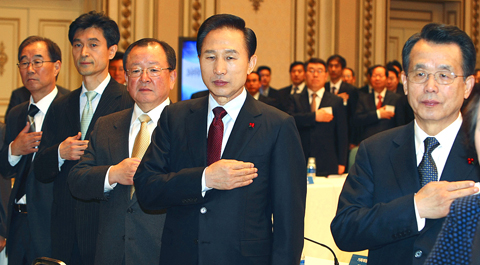South Korea’s economy may shrink in the first and second quarters of next year, affected by a global economic slowdown, South Korean President Lee Myung-bak said yesterday.
“The world economy is difficult and South Korea is heavily dependent on the external side,” Lee said at a meeting at the presidential house in Seoul, his official Web site reported.
“Even though we may post positive annual growth, we’re in danger of negative growth in the first and second quarters,” Lee said.

PHOTO: AP
SLOWING ECONOMY
South Korea’s economy will expand 2 percent, the slowest pace in 11 years, next year as the deepening global recession cools demand at home and abroad, the central bank said on Dec. 12. The economy last contracted for two consecutive quarters in 1998 and Lee’s comments come after he pledged last week to ensure growth next year.
“Negative growth is unavoidable,” said Chun Chong-woo, senior economist at SC First Bank Korea Ltd. “We’re bound to be affected by the global slump and the government will have to think of more aggressive policies to help spur the economy.”
Exports of goods will rise 1.3 percent, slowing from an estimated 3.6 percent gain this year, the central bank forecast in its outlook for next year. The nation targets exports of US$450 billion next year, the ministry of knowledge economy said on Friday, trimming its November forecast of US$500 billion.
OECD ADVICE
South Korea should use interest rate cuts and fiscal stimulus to cushion the economy from the global recession and avoid depleting its foreign currency reserves to prop up the won, the Organization for Economic Cooperation and Development said on Dec. 17.
The Bank of Korea has cut its key rate by 2.25 percentage points since October, the most aggressive easing since it first set a benchmark in 1999. The bank most recently cut the benchmark rate by 1 percentage point to a record low 3 percent on Dec. 11.
PUMPING IN FUNDS
South Korea is also pumping funds into banks, cutting taxes and boosting public spending to limit the fallout from the global credit crisis, which sent the South Korean won down more than 28 percent and the stock index tumbling 41 percent this year.
“We see the first and second quarters to be the bottom,” Lee said. “There’s hardly any country posting economic growth from the fourth quarter to the first quarter. There is an end to this agony. It won’t last 10 or 20 years.”

WEAKER ACTIVITY: The sharpest deterioration was seen in the electronics and optical components sector, with the production index falling 13.2 points to 44.5 Taiwan’s manufacturing sector last month contracted for a second consecutive month, with the purchasing managers’ index (PMI) slipping to 48, reflecting ongoing caution over trade uncertainties, the Chung-Hua Institution for Economic Research (CIER, 中華經濟研究院) said yesterday. The decline reflects growing caution among companies amid uncertainty surrounding US tariffs, semiconductor duties and automotive import levies, and it is also likely linked to fading front-loading activity, CIER president Lien Hsien-ming (連賢明) said. “Some clients have started shifting orders to Southeast Asian countries where tariff regimes are already clear,” Lien told a news conference. Firms across the supply chain are also lowering stock levels to mitigate

IN THE AIR: While most companies said they were committed to North American operations, some added that production and costs would depend on the outcome of a US trade probe Leading local contract electronics makers Wistron Corp (緯創), Quanta Computer Inc (廣達), Inventec Corp (英業達) and Compal Electronics Inc (仁寶) are to maintain their North American expansion plans, despite Washington’s 20 percent tariff on Taiwanese goods. Wistron said it has long maintained a presence in the US, while distributing production across Taiwan, North America, Southeast Asia and Europe. The company is in talks with customers to align capacity with their site preferences, a company official told the Taipei Times by telephone on Friday. The company is still in talks with clients over who would bear the tariff costs, with the outcome pending further

Six Taiwanese companies, including contract chipmaker Taiwan Semiconductor Manufacturing Co (TSMC, 台積電), made the 2025 Fortune Global 500 list of the world’s largest firms by revenue. In a report published by New York-based Fortune magazine on Tuesday, Hon Hai Precision Industry Co (鴻海精密), also known as Foxconn Technology Group (富士康科技集團), ranked highest among Taiwanese firms, placing 28th with revenue of US$213.69 billion. Up 60 spots from last year, TSMC rose to No. 126 with US$90.16 billion in revenue, followed by Quanta Computer Inc (廣達) at 348th, Pegatron Corp (和碩) at 461st, CPC Corp, Taiwan (台灣中油) at 494th and Wistron Corp (緯創) at

NEGOTIATIONS: Semiconductors play an outsized role in Taiwan’s industrial and economic development and are a major driver of the Taiwan-US trade imbalance With US President Donald Trump threatening to impose tariffs on semiconductors, Taiwan is expected to face a significant challenge, as information and communications technology (ICT) products account for more than 70 percent of its exports to the US, Chung-Hua Institution for Economic Research (CIER, 中華經濟研究院) president Lien Hsien-ming (連賢明) said on Friday. Compared with other countries, semiconductors play a disproportionately large role in Taiwan’s industrial and economic development, Lien said. As the sixth-largest contributor to the US trade deficit, Taiwan recorded a US$73.9 billion trade surplus with the US last year — up from US$47.8 billion in 2023 — driven by strong